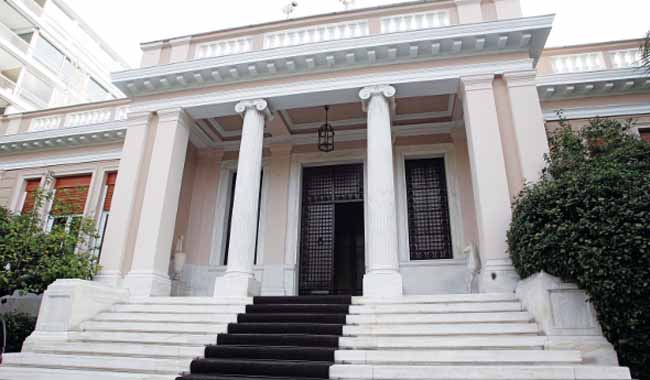 According to a definition, ‘groupthink’ is a psychological phenomenon that occurs in a group of people, in which the desire for harmony or conformity (within the group) results in an incorrect or deviant decision-making outcome. In this state of mind, group members try to minimize conflict and reach a consensus decision without critical evaluation of alternative ideas or viewpoints, and by isolating themselves from outside influences.
According to a definition, ‘groupthink’ is a psychological phenomenon that occurs in a group of people, in which the desire for harmony or conformity (within the group) results in an incorrect or deviant decision-making outcome. In this state of mind, group members try to minimize conflict and reach a consensus decision without critical evaluation of alternative ideas or viewpoints, and by isolating themselves from outside influences.
Sorry to say, this seems to be the case at the core of government strategy, namely amongst the staffers of the Maximos Mansion. From the politically insane theory of ‘the two extremes’ that tries to connect Golden Dawn criminal action with main opposition SYRIZA ideology, to the complete lack of rational public communication, all the way up to an absolute digital (web-centric) communication failure, Maximos Mansion basement people whistle a tune that heads towards disaster.
I need to be clear about a couple of things. Firstly, when I say ‘disaster’ I mean their own or the ruling party’s, not the country’s; secondly, in general, I have always stubbornly argued that during crisis, a solid communication strategy on behalf of the government is equally important as fiscal mainstreaming or national debt haircut. Why? Simply because when household income (black or other) is under attack, people need to stay informed in order to make wise decisions about their future.
Who is going to inform citizens about current affairs and most importantly about future austerity or growth plans of the government?
Greek citizens have before them a series of sources, credible or not. If one looks around, they could find lots of different voices: mainstream media (old and new), alternative digital sources, peers through social networks and of course the government, through its (un)official communication policy, if any.
The strangest thing is that this government is avoiding the internet like the plague. It was almost a month after Samaras government had assumed office in June 2012, when I became fixated about an anomaly and I kept complaining about it on Facebook. What was it? My thought was quite simplistic: since Antonis Samaras had become Prime Minister of Greece, it made sense to me that primeminister.gr should be updated and the name of the then interim PM (Pikrammenos) should give way to that of the new Prime Minister. After repetitive postings -which my Fb friends truly enjoyed- and some aggressive sharing with the government spokesman’s Fb page, the name was changed… in the Greek version. Then I became fixated with the English version, since I thought that non-Greeks that visited primeminister.gr would find it bizarre to see Samaras in Greek translated into… Pikrammenos in English. A few days later, the English version was updated too. This reflects the power of social networks, not the individual’s.
Nevertheless, this is an incident most people would consider of trivial importance. Alas, it is not. It clearly demonstrates the ability of the government, and most specifically of the PM’s office staffers to speak with citizens directly. At this moment this ability is next to zero. Until a couple of months ago, the welcoming photograph on primeminister.gr homepage is one of Samaras greeting Hollande during the latter’s visit in Athens. When exactly? No one remembers… In crisis terms, it seems a century ago… If it wasn’t for the Greek EU Presidency, that photograph would still act as the major point of entry on the PM’s website.
Again, is it about PM staffers doing some lousy job? Probably yes, but the significance is much more important for the government; it is a matter of synthesizing priorities.
These days, mainstream media are fighting for their survival. Those shops that can afford the extra move, seem to play along with the government, securing preferential access to information, sometimes bank financing, even advertisements from government agencies and public enterprises.
However, in the internet era, mainstream sources have lost control of the flow of information. Some say that news media do not own news anymore. Readership surveys suggest that a growing proportion of news readers prefer to use direct links suggested by their friends on social network pages rather than browsing news menus suggested by professional editors on structured homepages of mainstream news outlets. This is particularly evident in societies that are experiencing structural crises that affect population en masse.
In the Greek financial and political chaos, the government (any government) should claim the ability (and responsibility) of the primary definer. In media science terms it means the ability to define first the situation, enjoying the privilege of setting the rules of public discussion that follows. This task, combined with the social responsibility of handling the numerous parametres of the national crisis (and the subsequent social, and occasionally humanitarian problems) should be the prime manual of government communications, especially in view of upcoming elections.